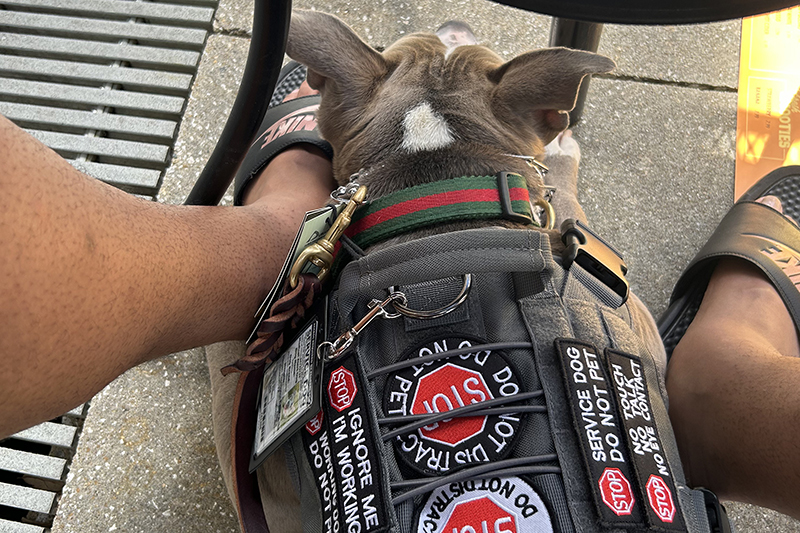Companions and Animals for Reform and Equity Launch Black History Month Series
February 18, 2023Changemakers Circle Gathering in New Orleans April 3 at 8 p.m.
April 3, 2023Sheila Donya Kouhkan
Speaking up isn’t easy, especially when there is a system stacked against you that benefits from your silence. Speaking up often comes with a consequence and there are always strings attached. In fact, in writing this blog, I know that I will face the consequence of not being able to see my family in Iran again until a new regime begins.
I haven’t seen my family in Iran for nearly 20 years. Most of them stayed there prior to the Iranian Revolution and the combination of the new Islamic Regime and sanctions by the United States has made it nearly impossible for them to visit or move to America after 1980. In Shiraz, my mom was the second youngest of seven children with a strong desire for adventure and educational growth. Under the Shah’s rule, there was an embassy in Iran so she was able to apply for a four year student visa and moved to Oklahoma where she proudly studied Computer Sciences. Meanwhile, in Isfahan, my father also got a student visa and moved to Utah to study Civil Engineering. Neither one of them had any idea how their lives and homes would change forever.
During the Iranian Revolution, my father was a strong activist for Democracy. He had many altercations with supporters of the Islamic Regime in the U.S., so returning home safely wasn’t an option. Fast forward several decades and my parents became proud citizens with two daughters and lived in Southern California. After things seemed to calm down in Iran with the inklings of a “pink revolution” in the 1990s, my parents contemplated moving our family to Iran before my sister and I hit our teenage years. But, they realized opportunities for my sister and I would be limited due to the lack of equal rights for women. So my father, a true “Girl Dad”, decided we would stay and ensure his daughters had opportunities afforded by what he believed was the American Dream.

There’s a weird sense of “survivor’s guilt” one experiences growing up in the United States of America while the majority of your family faces oppression in Iran. Being a woman from one of George W. Bush’s “axis of evil” countries wasn’t easy, and I was told to “go back to my country” more times than I can count. But, I still had many privileges at my fingertips. We would spend summers in Iran where I would wear the headscarf in 90 degree heat and do my best to follow rules I did not understand. It was all tolerable, though, as I knew I could soon return to my life of co-ed pool parties and cuddles with my pet dog, Boston, in beautiful California where we had separation of church and state and freedom of speech.
For perspective, here are some things we are able to do in the United States that are frowned upon by the morality police:
- Women showing their hair
- Dancing in public (or men watching women dance)
- Drinking alcohol
- Public displays of affection with the opposite sex, including holding hands
- Dog ownership
- Dating apps
- Women showing skin aside from their wrists to fingertips, ankles to toes, and faces
- Homosexuality
It’s important to note that these rules were not dictated by Islam and one cannot point blame at the religion itself. Instead, this is the doing of religious extremists who use religion to silence entire groups of people. Religion is supposed to lead with love, not hate. It is supposed to unite people, not vilify and divide them.

Since the Islamic Revolution in 1979, Iranians have been fighting for their rights but have been rendered voiceless through fear and intimidation by entities like the morality police. There have been many attempts at uprisings over the years, including the Green Revolution in 2009 that was popularized by the disturbing viral video of another young woman, Neda. It was at this time that I held my first televised protest with my face exposed, and thus surrendered my ability to safely travel to Iran.
Over ten years later, the current protests sparked by Mahsa Amini’s murder in 2022 have gained the most traction. This is the largest feminist revolution in history, and Iran’s youth have decided that they must rise up to change the status quo, even if it is a matter of life and death.
______________________________________________________________________________
On this International Women’s Day, it has been 173 days since Mahsa Amini’s death and there have been many more public executions and murders of Iranians who have innocently tried to speak up about the wrongdoings of the current regime. I will spare you all from these triggering narratives, but will share that the latest alleged tactic has been to poison schoolgirls, perhaps in an effort to, again, render women voiceless before they have the opportunity to disrupt or learn the power of their voices. Another painful (and lonely) truth that I will uncomfortably share is that it has been heartbreaking to observe the silence of so many when it comes to highlighting the fight taking place in Iran at this time. I find myself asking many questions about why this could be. Is it because people don’t see themselves in our brown eyes and skin? Is it because they believe we are animals, like my sorority sister’s mother so boldly proclaimed on her Facebook page? Are people afraid of admitting the harms that can occur when church and state become intertwined? The list goes on and on.
Today’s Iranian activists are not asking for money, supplies, or weapons; they are simply asking for their stories to be shared and their voices to be heard across our varying platforms. We must be their megaphones and, in turn, put pressure on their oppressors to end the murderous regime and begin leading with positive change. The theme of this Women’s History Month is “Celebrating Women Who Tell Our Stories” so I am making a commitment to share the stories of my Iranian sisters and I invite you all to do so as well with their slogan in mind: Woman, Life, Freedom.
Coming soon- Part 2: Zendegi (Life) and Part 3: Azadi (Freedom)
Disclaimer: All opinions in this blog are my own. Photos have been censored for privacy and safety.
Additional resources in case you are interested in learning more:
“Baraye” by Shervin Hajipour– the first Grammy winner for Song for Social Change
“Baraye” with lyric translation
Timeline of the Iranian Revolution
History of Iranian Student Enrollments in the United States
Photos of Iranian women before the 1979 revolution




